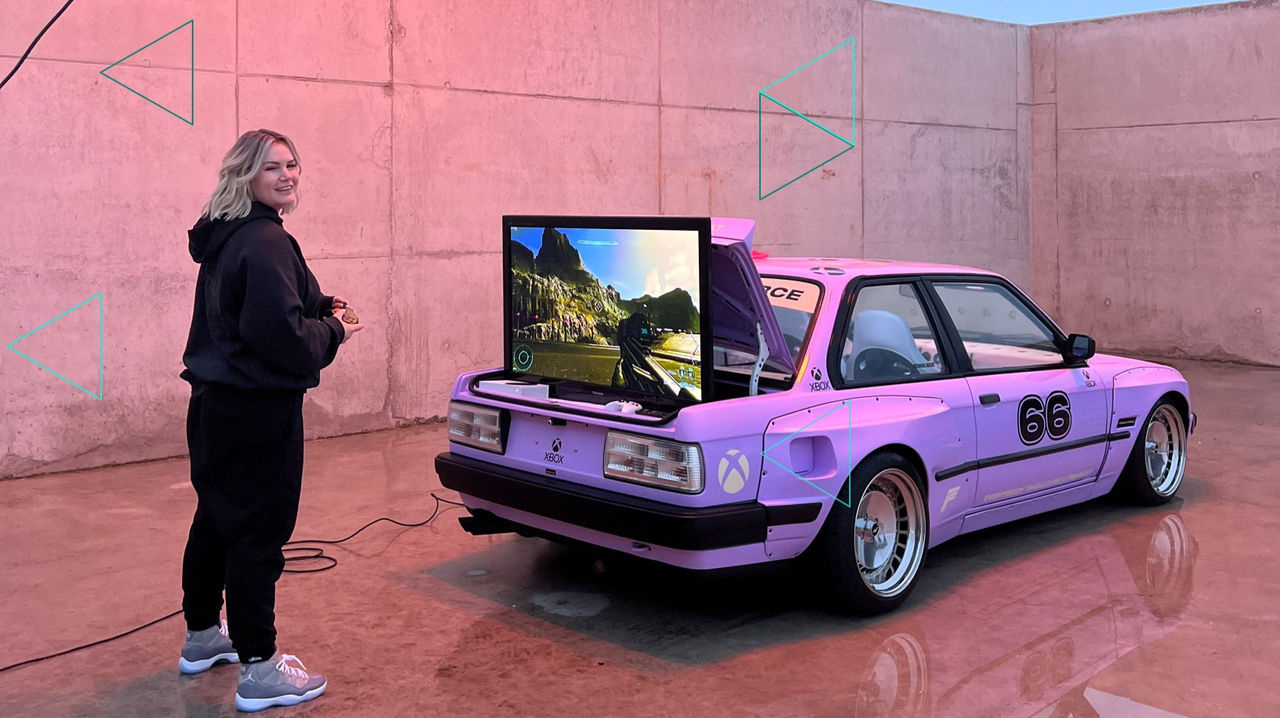Pathfinding: Preparing Xbox games and devices for international markets
Laura Hamilton, Senior Global Readiness lead, shares how she channels her love of cultures and languages into guidance for international game devs.

Bringing great games to markets around the world means creating content that resonates locally and is both authentic and compliant. To do this well requires diverse perspectives, brought together by someone who loves international cultures. Last week we heard from Monisha Monikantarajan about Age Ratings & Safety, and this week we are talking with Laura Hamilton, Senior Global Readiness lead for Xbox Studios Services (XSS).
You’ve had a long career at Microsoft – tell me about how you got into gaming.
I’ve been at Microsoft for 27 years. Microsoft raised me, in a sense, and I’ve loved every minute of it. I have a Bachelor of Fine Arts (BFA) degree from the University of Washington, and I’ve always loved art and the creative process. While my job has often been to manage risk, I never want to ruin someone’s creative vision, so I’m always trying to find that win-win scenario to help a game succeed. After completing my BFA I got a technical writing certificate and started as a contractor in Visual Studio writing documentation for C++ and C#. When I was younger, I played Pong and Breakout on Atari. Then when I got married, my husband was a big gamer, and he kept my interest in games going. When Microsoft was getting ready to release the original Xbox, I joined the team. I wanted to work on entertainment content and do something different, and I’ve been in games ever since.
I took a brief break from Xbox a few years ago to work on the Global Readiness & Opportunities team in CELA (Microsoft Corporate, External and Legal Affairs). I still focused on Xbox but working with this broader corporate team allowed me to learn from folks across the company and bring that tight relationship with governance and compliance back to my teams in Xbox when I returned.
What can you tell our readers about your current job?
I am the Global Readiness lead for the Xbox business unit. I run the Global Readiness Program which is about managing geopolitical risk when building products that will be released to international markets. It’s a set of requirements, best standard practices, and accumulated learnings that help ensure our games, devices, and platforms serve our global customers who do not speak English or who may speak English as a second language. It also means collaborating on other globalization initiatives like making authentic content that will resonate regionally. We want to build experiences that everybody feels comfortable in – to do that we must consider language, culture, and region.
We have translation teams for localization, but it sounds like you are making other changes to games to make them more appealing or feel safer in local markets?
You asked that question at a perfect time because the G4E (Gaming for Everyone) team is collecting resources to help teams across Xbox think about globalization. What do we mean when we say globalization? One of the key principles is that content resonates locally, which might mean creating regional content.
For example, Maxi Graeff at our Munich office (whom you can read more about in this Pathfinding post) had the opportunity to partner with Universal Music to showcase Xbox products in a video created by an all-female German hip-hop group and production crew. The goal of the collaboration was to show that female rappers have a place in the hip hop industry. The video depicted the artists as futuristic superwomen who give their own spin to pop-culture elements and symbols that are traditionally considered masculine. Maxi jumped at the chance to create a meaningful connection between the European hip hop scene and our Xbox brand; however, the video included some content that caused our Redmond teams some concern.
Maxi and I identified several risk mitigations, the first and foremost being that the song and video were a limited release for German-speaking markets only (Germany, Switzerland, and Austria), where some of the cultural concerns were not the same as in the US. In addition, Universal Music edited the video to minimize concerns and 343 Industries approved the Halo product placement. Maxi and her team ensured manageable geopolitical risk because they were in tune with their local customers, worked with reputable partners, and reached out for a geopolitical risk assessment. Our US team was open to supporting regional content that might not work for all markets but resonated with German-speaking fans. Upon release, the video received 99% positive comments on social, which was a first for Universal Music.

And that’s just one aspect of global readiness. There are other considerations that might not be obvious, such as when you have an in-game map. If it has international borders that’s considered high risk because not every country agrees on borders and sovereignty – that’s a geopolitical global readiness issue.
How do you keep up with all the changes happening in so many different countries? It sounds overwhelming.
I don’t have time to read the news during the day, so believe it or not I lay in bed and scroll through international news to downshift at the end of the day. I also have alerts set up for specific terms and topics. I try to go through headlines and alerts a couple times a week, and then I organize them in chronological order on our SharePoint and tag them with the topics we track in global readiness.
I encourage all our global readiness champs to follow the geopolitical headlines in the news. Even if they don’t know how it applies to their game it gives them visibility and awareness of other markets, and they can always bring topics to me, and I’ll help them figure out if it applies to their game and if we need additional reviews or inputs. As much as possible we try to follow Microsoft standards to keep the guidelines clear, and I work closely with CELA if there is something gaming specific we need help interpreting.
How has diversity impacted your career journey?
I think the XSS team is the most diverse team I’ve worked on – both in terms of job roles and cultural backgrounds. We have people from Nigeria, India, Ghana, Pakistan – some living in their home countries and some that live in other countries now. I love that international diversity because globalization really requires additional awareness and perspective from other parts of the world. We have many North American teams that are predominately English speaking, and we need people from different locations working alongside us to bring our games to new and underserved markets. We need people who aren’t afraid to ask questions and start conversations – and we should leverage their input and experiences because they were born and raised in these markets. They’re the experts.
I just love working with people who are bilingual, who come from cultures and backgrounds that are different from mine. Diversity is the spice of life for me. I’m bored of my own background; I want to learn about others. It’s wonderful to learn from my teammates and it makes a much more enriching work environment for me and has led to so many fun games. Diversity means we are more than the sum of our parts and our differences provide incredible potential to lead by example.
